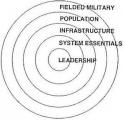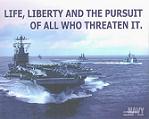I agree that he said it and I am sure he meant it but Is that quote from the most recent article? I don't seem to be able to find it in there. Within the context of Muslims attacking Muslims yes UBL has restraints but within the context of Muslims attacking infidels what restraints does he have? So because of that I don't see how a Strategist could come up with a solution.





 )
) .
.


Bookmarks